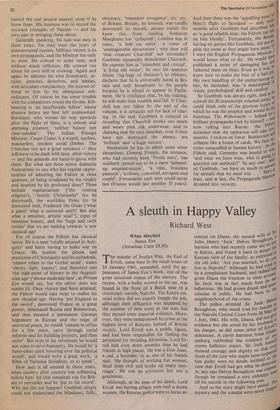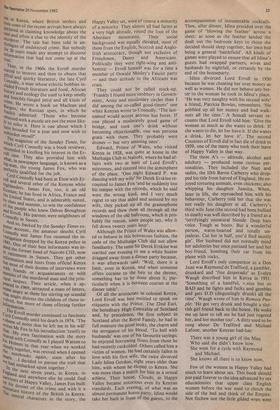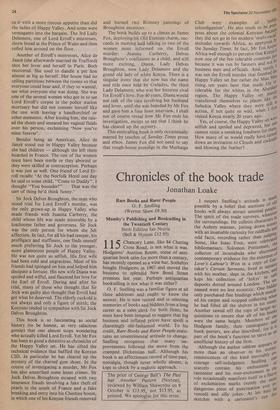A sleuth in Happy Valley
Richard West
White Mischief James Fox (Jonathan Cape £8.95)
The murder of Josslyn Hay, the Earl of Erroll, some time in the small hours of 24 January 1941, remained, until the ap- pearance of James Fox's book, one of the great unsolved crimes of the century. The corpse, with a bullet wound in the ear, was found in the front of a Buick near to a crossroads outside Nairobi. The Kenya col- onial police did not exactly bungle the job, although their efficiency was impaired by the number of men away at the war; but they missed some material evidence. More- over, they were embarrassed by crime at the highest level of Kenyan, indeed of British society. Lord Erroll was a public figure, and had been responsible for finding the personnel for invading Abyssinia. Lord Er- roll had even more enemies than he had friends in high places. He was a Don Juan, a cad, a bounder; or as one of his friends said: 'He thought of nothing but women, liked them rich and broke up many mar- riages'. He was an aristocrat but not a gentleman.
Although, at the time of his death, Lord Erroll was having affairs with half a dozen women, the Kenyan police were to focus at-
tention on Diana, the second wife of Si; John Henry 'Jock' Delves Brought011', e baronet who had recently come out to It in Kenya, and found it hard to accept the Kenyan view of the family, as expresseeil"., the old joke: 'Are you married, or do Yrtd's live in Nairobi?' Although he had trieciL be a complaisant husband, and indeed 7:1, given Diana the freedom to sleep arcijniier Sir Jock was in fact much hurt by behaviour. He had grown drunk and Mlle relsome in public. He had been ill the relsome of the crime.I, Ives The police arrested Sir Jock ye' al Broughton, who stood trial for murdertill the Nairobi Central Court from 26 MaY•ve 1 July, 1941. His wife, Diana, did not „glin evidence but she stood by her husbanu,5 his danger, as did some other of Err n• mistresses. A clever barrister from .11°''':ne nesburg rubbished the evidence of 'cif crown ballistics expert. Sir Jock Ilitrisen showed courage and dignity so that ev,d those of the jury who might have susPee`be him guilty were no doubt inclined t° ted. ed view that Erroll had got what he deserved At any rate Delves Broughton was clear an though he remained a very unhappy till his suicide in the following year' , The And so the story might have endeu' „ot. mystery and the scandal were never for6 ten in Kenya, where British settlers and even some of the recent arrivals have always Persisted in claiming knowledge about the case and often a clue to the identity of the murderer. The tale has been told in an- thologies of undetected crime. But nobody for 20 Years made any attempt to discover Information that had not come up at the trial, „ Then, in the 1960s the Erroll murder started to interest and then to obsess that
gifted and quirky literateur, the late i Cyril
C, Connolly, a man whose eclectic hobbies n- cl uded French literature and food, African history and zoology (he used to keep smelly and horribly-fanged pets) and all kinds of crime.
He wrote a book on Maclean and
Burgess,, the Russian spies, in which he frankly admitted: 'Those who become obsessed with a puzzle are not the most like- ly to solve it Here is one about which I have brooded for a year and now wish to unburden myself'. ,...rhe magazine of the Sunday Times, for 'Inch Cyril Connolly was a book reviewer, succeeded in kindling his interest in the E. r- roll case. They also What, provided him with ihat, in newspaper language, is known as a egsman, the young James Fox, who was Perfectly qualified for the job. ,C,yril Connolly had been at Eton with Er- roll and several other of the Kenyan white 111811landers. James Fox, too, is an old t°11tall; he has lived in Africa, France and b'e Y United States, and is admirably suited, ofclass and manner, to win the confidence the people who knew Delves Broughton act d Erroll. His parents were neighbours of °,11nollY in Sussex. And so, backed by the Sunday Times ex.- Dense account, the amateur sleuths Cyril 1311.11°4 and James Fox resumed the in- 19estigation dropped by the Kenya police in 41. One of their best informants was deed the the former head of Nairobi CID, now in retirement in Sussex. They got other wainaformation and hints from official Kenya ost of their dozens of interviews were eifriends or acquaintances or with crilenttes of the murdered man and the prin- hPal susPect. Their article, when it ap- sPoeared in 1969, attracted a mass of letters, that might angry at them for stirring up scandal might distress the children of those in- ‘-'`ved. but more of them offering further Information.
The Erroll murder continued to fascinate l';Yird Connolly until his death in 1974. 'The
dates of notes that he left me in his will' th'Ites Mr Fox in his introduction 'testify to share My own fascination with the story his with Connolly as 1 played Watson to Closely Holmes in that year when we worked it(2'sely together, was revived when I opened dee noteboo ks again, son after his kveal,11- • -1 decided to pursueo the trail that had embarked upon together.' .,131 the next seven years, in Kenya, in Igl.and and anywhere else he could find 'littprviv. ors of Happy Valley, James Fox built his dossier of the crime and with it a i'_ntatu n re history of the British in Kenya. e central characters in the story, the
Happy Valley set, were of course a minority of a minority. They almost all had farms at a very high altitude, round the foot of the Aberdare mountains. Their social background was equally elevated, most of them from the English, Scottish and Anglo- Irish aristocracy, though not exclusive of Frenchmen, Danesand Americans. Politically they were right-wing and anti- Semitic — Erroll himself was for a time a member of Oswald Mosley's Fascist party — and their attitude to the Africans was crass.
They could not be called stuck-up. `Frankly I found more snobbery in Govern- ment, Army and missionary circles than I did among the so-called good-timers' one white Kenyan wrote to Connolly. 'The last- named would accept anyone but bores. If one played a moderately good game of bridge, and took one's drink without becoming objectionable, one was persona grata with them. They probably were drones — but very amusing ones'.
Edward, Prince of Wales, who visited Kenya in 1928, was quite at home in the Muthaiga Club in Nairobi, where he had af- fairs with two at least of Lord Erroll's mistresses, and entered into the atmosphere of the place. 'One night Edward P. was dancing with my wife' Sir Derek Erskine re- counted to James Fox 'and he suddenly lost his temper with the records, which he said were the wrong kind, and I very much regret to say that aided and assisted by my wife, they picked up all the gramophone records and thew them all through all the windows of the old ballroom, which is pro- bably the reason, some people say, why it fell down twenty years later'.
Although the Prince of Wales was allow- ed to behave in this boisterous fashion, the code of the Muthaiga Club did not allow familiarity. The same Sir Derek Erskine was startled one evening to see a white hunter dragged away from a dinner party because, it was afterwards said: 'Well, there is a limit, even in Kenya, and when someone offers cocaine to the heir to the throne, something has to be done about it, par- ticularly when it is between courses at the dinner table'.
Of all the aristocrats in colonial Kenya, Lord Erroll was bestentitled to speak on etiquette with the Prince. The 22nd Earl, the hereditary High Constable of Scotland and, by precedence, the first subject in Scotland after the Royal Family, he had in full measure the good looks, the charm and the arrogance of his blood. `To hell with husbands' was one of his favourite sayings; lie enjoyed borrowing fivers from those he had recently cuckolded. Others called him a victim of women. He had certainly fallen in love with his first wife, the twice divorced Lady Idina Gordon, eight years older than him, with whom he eloped to Kenya. She was more than a match for him as a sexual athlete. Their house, Clouds, in Happy Valley became notorious even by Kenyan standards. Each evening, of what was an almost permanent house party, Idina would take her bath in front of the guests, to the
accompaniment of innumerable cocktails. Then, after dinner, Idina presided over the game of 'blowing the feather' across' a sheet: as soon as the feather landed she dealt out the bedroom keys to those she decided should sleep together, her own bed being a general 'battlefield'. All kinds of games were played to ensure that all Idina's guests had swapped partners, wives and husbands by nightfall, or certainly by the end of the houseparty.
Idina divorced Lord Erroll in 1930 because he was cheating her over money as well as women. He did not behave any bet- ter to the woman he took in Idina's place. `He was very naughty with his second wife' a friend, Patricia Bowles, remembers. 'He gobbled up all her money and had walk- outs all the time.' A Somali servant re- counts that Lord Erroll told him: 'Give the woman as much as she wants to drink. If she wants to die, let her have it. If she wants a drink, let her have it'. The second Countess of Erroll did in fact die of drink in 1939, one of the many who took their leave of Happy Valley in that way.
The three A's — altitude, alcohol and adultery — produced some curious per- sonalities. They included the Nazi and sadist, the 10th Baron Carberry who drop- ped his title from hatred of England. He en- joyed torturing animals, even chickens; also whipping his daughter Juanita. When, later in life, she reproached him with his behaviour, Carberry told her that she was not really his daughter at all. Carberry's third wife June (the second had been bullied to death) was well described by a friend as a `terrifyingly unnatural blonde. Deep bass voice. Tough as boots. But a wonderful person, warm-hearted and totally un- jealous. Cut her in half, you'd find mostly gin'. Her husband did not normally mind her adulteries but once pursued her and her boy-friend, bombing their car from his plane with rocks.
Lord Erroll's only competitor as a Don Juan was Raymond de Trafford, a gambler, drunkard and 'fine desperado' as Evelyn Waugh described him in Kenya in 1931. `Something of a handful, v.nice but so BAD and he fights and fucks and gambles and gets D.D (disgustingly drunk) all the time'. Waugh wrote of him in Remote Peo- ple: 'He got very drunk and bought a slut- tish girl friend back to the house. He woke me up later to tell me he had just rogered her, and her mother too'. A ditty used to be sung about De Trafford and Michael Lafone, another Kenyan bad-hat: There was a young girl of the Mau Who said she didn't know how. She went for a cycle with Raymond and Michael.
She knows all there is to know now.
Few of the women in Happy Valley had much to learn about sex. This book should put paid forever to the idea advanced by sex educationists that upper class English women before the war used to clutch the side of the bed and think of the Empire. Not fitchew nor the little gilded wren went to it with a more riotous appetite than did the ladies of Happy Valley. And some were termagants into the bargain. The 3rd Lady Delamere, one of Lord Erroll's mistresses, threw bread at the Prince of Wales and then rolled him around on the floor.
Another of Erroll's mistresses, Alice de Janze (she afterwards married de Trafford) shot her lover and herself in Paris. Both recovered. She used to dandle a pet lion almost as big as herself. Her house had no ceiling partitions between the rooms so that everyone could hear and, if they so wanted, see what everyone else was doing. She was one of the several women who got in to see Lord Erroll's corpse in the police station mortuary but did not content herself like the rest with leaving a handkerchief or other memento. After kissing him, she rais- ed the sheets and smeared her vaginal fluids over his person, exclaiming 'Now you're mine forever'.
Besides being an American, Alice de Janze stood out in Happy Valley because she had children — although she left them boarded in France. The rest of the women must have been sterile or they aborted or they were skilled at contraception. Perhaps it was just as well. One friend of Lord Er- roll recalls: 'At the Norfolk Hotel one day he said to some child, "Come to Daddy". I thought "You bounder!" ... That was the sort of thing he'd think funny.'
Sir Jock Delves Broughton, the man who stood trial for Lord Erroll's murder, was the only grown-up in Happy Valley who made friends with Juanita Carberry, the child whose life was made miserable by a loathsome father and governess. Sir Jock was the only person for whom she felt affection. In fact, for all his bad temper, his profligacy and stuffiness, one finds oneself much preferring Sir Jock to the younger, more glamorous people of Happy Valley. He was not quite so selfish. His first wife had been cold and ungracious. Most of his friends had sponged on him and helped him dissipate a fortune. His new wife Diana was spoiled and wilful, and flaunted her love for the Earl of Erroll. During and after his trial, many of those who thought that Sir Jock was guilty also thought that Erroll had got what he deserved. The elderly cuckold is not always and only a figure of mirth; the Kenyans tended to sympathise with Sir Jock Delves Broughton.
This book is so fascinating as social history (to be honest, as very salacious gossip) that one almost stops wondering who actually killed Lord Erroll. Yet Mr Fox has been as good a detective as chronicler of the Happy Valley set. He has sifted the technical evidence that baffled the Kenyan CID. In particular he has cleared up the mystery of the charred gym shoes. In the course of investigating a murder, Mr Fox has also unearthed some lesser crimes. Sir Jock Delves Broughton escaped with two insurance frauds involving a fake theft of pearls in the south of France and a fake breaking and entry into his Cheshire house, in which one of his Kenyan friends removed and burned two Romney paintings of Broughton ancestors.
The book builds up to a climax as James Fox, deploying his Old Etonian charm, suc- ceeds in meeting and talking to two of the women most informed on the Erroll murder: Juanita Carberry, Delves Broughton's confidante as a child, and still more exciting, Diana, Lady Delves Broughton, now Lady Delamere and the grand old lady of white Kenya. There is a singular irony that she now has the name and title once held by Gwladys, the third Lady Delamere, who was her bitterest rival for Erroll's love. For 40 years, Diana would not talk of the case involving her husband and lover, until she was bearded by Mr Fox and gave him a four hour interview. I shall not of course reveal how Mr Fox ends his investigation, except to say that I think he has cleared up the mystery.
This enthralling book is only occasionally marred by touches of Sunday Times prose and ethos. James Fox did not need to say that rough-house evenirigs in the Muthaiga Club were examples of `Public schooliganism'. He also tends to be Pom- pous about the colonial Kenyans because, they did not go in for modern 'multi-racial attitudes towards Africa, as approved I)) the Sunday Times. In fact, Mr Fox knoos Africa well enough to perceive that KenYniSt now one of the few tolerable countries ins because it was run by farmers and not by business men and officials. And, surelY, ii was not the Erroll murder that finished the Happy Valley set but rather the Man M.311 rising ten years later that made life in tolerable for the whites in the Aberdar', region. The Happy Valley set merei )e transferred themselves to places like ti! Subukia Valley where they were still action, if not quite so wild, when 1 first visited Kenya nearly 20 years ago. Yes, of course, the Happy Valley set weree selfish and spoiled and depraved, but on cannot resist a sneaking fondness for iber11.; How many of us would really have turned down an invitation to Clouds and cocktails and blowing the feather?












































 Previous page
Previous page